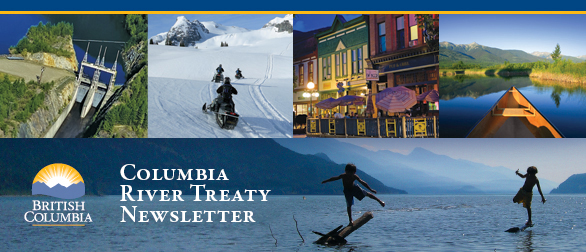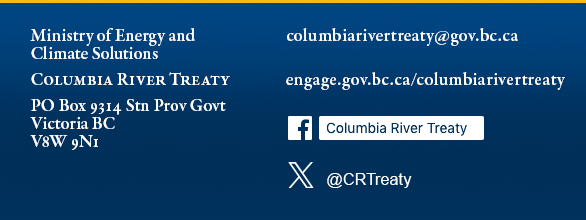Columbia River Treaty
Edition: April 2021

More than 200 participate as Columbia River Treaty virtual town hall goes into overtime
Apr 27, 2021
Participation in the Province’s virtual town hall this February suggests that interest in the Columbia River Treaty is as strong as ever. More than 200 people joined the evening Zoom meeting, from both Canada and the U.S. A YouTube video of the event has racked up more than 1,700 views at the time of this Newsletter’s publication. Planned as a two-hour event, the town hall stretched out to nearly three hours, as presenters stayed late to answer questions from those watching and listening.
Since in-person, community-level meetings aren’t currently possible, the virtual town hall was organized to give people from across the Columbia Basin and beyond a chance to hear from, and ask questions of, Canadian negotiators, Indigenous Nations, local government representatives and others involved in efforts to modernize the Columbia River Treaty. This wide-reaching approach provided an excellent opportunity for folks across the vast region to hear each others’ interests and perspectives.
People asked questions about: Treaty governance; Canada’s June 2020 proposal to the U.S. for a modernized Treaty; reservoir operations and the fluctuation of water levels; salmon restoration and fish passage; impacts of the Treaty on Basin residents; the role of Indigenous Nations and U.S. Tribes in the negotiation process; climate change; ecosystems; and more.
Minister Katrine Conroy started the meeting by expressing how pleased she is to remain Minister Responsible for the Columbia River Treaty, which is so important to the region she represents.
Sylvain Fabi, Canada’s Chief Negotiator for the Treaty spoke next, providing an update on Canada-U.S. negotiations.
Kathy Eichenberger, Executive Director of B.C.’s provincial Treaty Team, also spoke about the transboundary discussions, as well as domestic activities, including early efforts to explore possible future governance options for Canadian operations, and different Treaty dam scenarios to help inform Canada’s negotiating positions.
Nathan Matthew (Secwepemc Nation), Jay Johnson (Syilx/Okanagan Nation) and Bill Green (Ktunaxa Nation) shared their perspectives on Indigenous participation in the negotiations, in particular, regarding the collaborative development of Canada’s first proposal for a modernized Treaty, presented to the U.S. at the 10th round of negotiations last June. Bill Green and Jay Johnson then dug deeper into the work the three Nations are leading to enhance Basin ecosystems and restore salmon to the Upper Columbia River.
The final two presentations were made by Columbia River Treaty Local Governments’ Committee (LGC) members: LGC Chair Linda Worley spoke about the recommendations for the Treaty that the LGC has made to the provincial and federal governments, after which Executive Director Cindy Pearce went into more detail about the process the LGC is leading to integrate socio-economic factors into modelling of Treaty scenarios, and integrating these with Indigenous cultural values, ecosystems, flood-risk management, and hydropower generation.
Feedback on the session was largely positive, with many participants expressing thanks to the presenters for providing candid and informative answers to the questions asked. In a survey circulated after the event, people said they support future virtual town halls and are keen for more detail about the many issues affected by the Treaty – ecosystems, flood management, shoreline erosion, and Indigenous cultural values, to name a few.
All materials from the Town Hall are posted on the Province’s Columbia River Treaty website. A report summarizing the event will be posted there in the near future.
The Province plans to host another virtual town hall session this fall.


